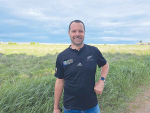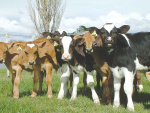A slaughterman who received home detention over the abuse of bobby calves has had his sentence replaced with a two year prison term following an appeal by the Ministry for Primary Industries.
Noel Erickson, 39, was sentenced to 10 months home detention and 200 hours of community work when he appeared in the Huntly District Court in July this year.
He had earlier pleaded guilty to 10 charges over the abuse of 111 bobby calves at a Te Kauwhata pet food processing plant in August last year.
The charges included wilfully ill-treating a calf and representative charges of recklessly ill-treating calves, ill-treating calves, and using blunt force trauma.
Penalties for the offences ranged from a maximum five years imprisonment or maximum fine of $100,000 (or both), to charges carrying a maximum penalty of 12 months imprisonment or a maximum fine of $50,000 (or both).
The Crown lodged an appeal over Erikson’s sentence on behalf of the Ministry for Primary Industries in August.
MPI compliance operations manager Gary Orr says MPI welcomes the decision.
“Erickson’s offending involved a significant number of calves who were treated with extreme cruelty.
“There was clear evidence of abuse including of Erickson throwing and dropping calves onto the ground, kicking and hitting them, and dragging some under a gate.
“Justice Patricia Courtney has quashed the sentence of home detention and community work and substituted it with a sentence of two years’ imprisonment.
“MPI takes animal abuse very seriously. When we get information about the mistreatment of animals, we conduct thorough investigations. When there is offending, we take action and people are held to account.
“MPI introduced new regulations governing the welfare and management of bobby calves in August this year. Since then, we have been actively reinforcing the new regulations with warning letters and infringement notices.
“The new regulations, combined with a comprehensive education programme targeted at farmers, transport operators and processors, are part of a suite of initiatives designed to ensure we see significant improvements.
“I’m very pleased to note that this season, we have seen a material improvement in the condition of calves that end up in processing facilities. The reality is, we’re not going to see problems fixed overnight but with continued and ongoing education and the introduction of new, strengthened regulations we would expect fewer incidents of this nature.”
Orr says MPI has a number of active investigations underway related to this bobby calf season.
In addition, the investigation initiated last year that resulted in the Erickson conviction is ongoing and another related case is currently before the courts.


















